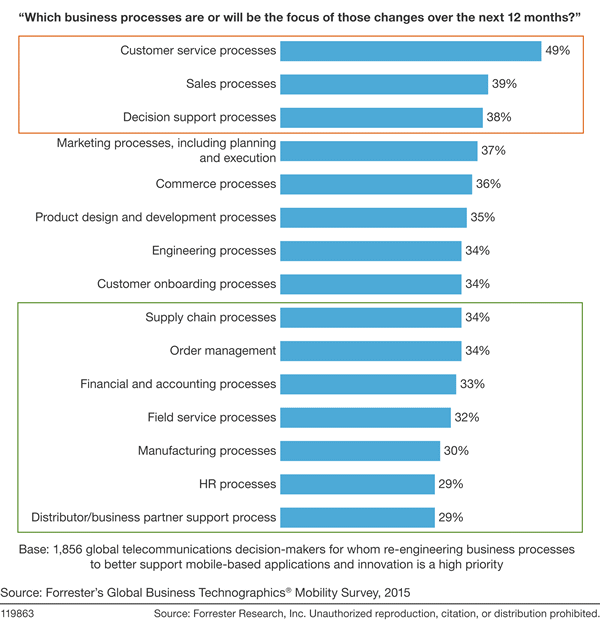 A new report from Forrester analyst Dan Bieler and his colleagues, confirms what many people intuitively know: CIOs have no room for failure when it comes to mobile. The report, “Mobile Becomes A Key Success Imperative For CIOs,” has this blunt warning:
A new report from Forrester analyst Dan Bieler and his colleagues, confirms what many people intuitively know: CIOs have no room for failure when it comes to mobile. The report, “Mobile Becomes A Key Success Imperative For CIOs,” has this blunt warning:“The CIO who fails in mobile will lose his job.”
It’s no idle warning. Forrester report data shows that companies that the most “mobile-mature” companies have higher growth rates that companies that are mobile laggards. Mobile does even more than that, the report concludes: It can also transform the way organizations work, bring down costs and improve efficiency. The report explains:
“Mobility is the single most critical tool to support the top strategic business imperatives. In his role as business enabler, the CIO must deliver high-quality mobile solutions to his organization or risk being replaced.”
The report says that CIOs overall “must ensure that legacy systems can migrate toward mobile clients, simplify the task of accessing mainframe data from mobile apps, and convert existing apps toward mobile apps, all while maintaining data and business logic.”
What It Means In Practice
What does this actually mean in the day-to-day life of a CIO? For a start, CIOs can’t be satisfied with only providing basic enterprise mobility management (EMM) and improving employee productivity. The report notes that even though boosting productivity remains high on the list of CIO initiatives (80%), right behind it are projects aimed at closer customer engagement (78%), forging tighter supplier relationships (76%), selling more effectively (74%), and creating a faster go-to-market approach for the company (70%).
Beyond that, CIOs need to use mobile to transform the way their organizations work --- and they seem to be getting that message. Fifty nine percent of telecommunications decision-makers expect to use mobile to further innovation, and 58% believe it will “support opportunities that the digital transformation offers to their organization.”
The report has this primary recommendation for how CIOs can best serve their companies:
“Leading CIOs will manage mobile projects from a perspective of supporting specific business processes. The CIO will increasingly focus on customer-facing business processes such as customer service, sales, and decision support.”
That is in line with what many CIOs are planning to do over the next year: 49% say they will use mobile to improve customer service processes, 39% will deploy it to improve sales processes, and 38% will use it for improving decision-support processes.
Overall, for CIOs to succeed, the report recommends that CIOs develop a clear mobility road map, forge closer relationships with business-line managers, assign mobile technology experts to work closely with specific business lines, reach out to third parties for help, and keep an eye on emerging mobile technologies.
To see how Alpha Software helped one CIO transform her business for the mobile era, read this CIO case study.
Read more about what mobile issues are keeping CIOs up at night.








Comment